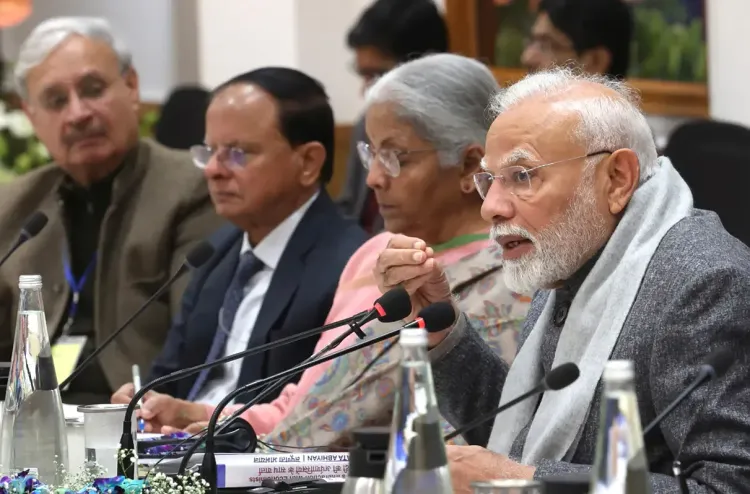PM Modi Engages Economists for Insights Ahead of Budget Planning

New Delhi, Dec 24 (NationPress) On Monday, Prime Minister Narendra Modi conducted a session with renowned economists and sector specialists to solicit their opinions and suggestions for the forthcoming 2025-26 Budget.
The Finance Minister, Nirmala Sitharaman, is set to present the budget in the Lok Sabha on February 1, 2025.
Present at the meeting were the Finance Minister, Niti Aayog Vice Chairman Suman Bery, Niti Aayog CEO BVR Subrahmanyam, Chief Economic Advisor Anantha Nageswaran, along with eminent economists such as Surjit Bhalla and DK Joshi.
This meeting occurs against the backdrop of the government's intention to persist with significant investments in infrastructure projects to stimulate growth and generate more employment opportunities in a slowing economy.
The government has initiated various welfare programs for the underprivileged, including free food grains and housing assistance for the impoverished in both rural and urban regions.
Inflation levels have lessened over the past month as food inflation has subsided, permitting the RBI to decrease the cash reserve ratio (CRR) for banks by 0.5 percent, reducing it from 4.5 percent to 4 percent. This marks the first CRR cut since March 2020, which will inject Rs 1.16 lakh crore into the banking system and lower market interest rates.
The upcoming budget is anticipated to provide a fiscal stimulus aimed at accelerating economic growth. India has maintained its position as the fastest-growing major economy globally, with robust tax collection supporting fiscal stability.
According to the latest statistics from the Central Board of Direct Taxes (CBDT), India’s net direct tax collections, which include corporate and personal income taxes, surged by an impressive 15.4 percent to Rs 12.1 lakh crore between April 1 and November 10 during the current financial year.
The Centre's fiscal deficit at the conclusion of the first seven months (April-October) of the current fiscal year stands at 46.5 percent of the full-year target, according to official data released last month.
This indicates a strong macroeconomic financial stance, with the government adhering to its fiscal consolidation strategy. The aim is to reduce the fiscal deficit to 4.9 percent of gross domestic product (GDP) in this financial year, down from 5.6 percent in 2023-24.
Additionally, there has been a substantial rise in GST collections fueled by increasing economic activity.
The strong tax collections provide more resources for the government, helping to keep the fiscal deficit under control, thereby enhancing the macroeconomic fundamentals of the economy. A lower fiscal deficit reduces the need for government borrowing, allowing more capital to remain in the banking system for larger enterprises to borrow and invest, ultimately leading to increased economic growth and job creation.
Furthermore, a reduced fiscal deficit contributes to stabilizing the inflation rate, which further enhances economic stability.









